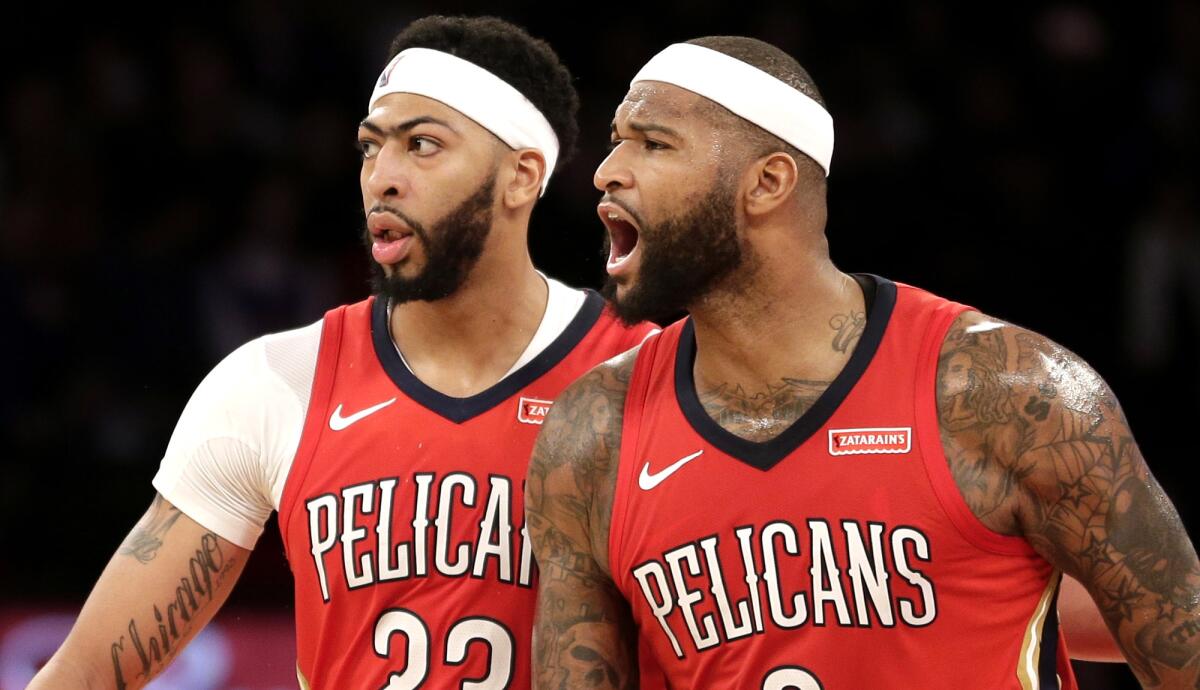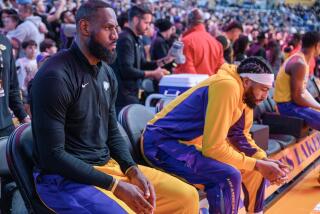Column: DeMarcus Cousins’ injury changes future for Lakers, Anthony Davis

- Share via
What do you make of this, another sign of bad news for the Lakers’ latest crack at a title?
Maybe you view DeMarcus Cousins signing late in free agency as a lottery scratcher — a low-risk investment that if it hits, great, and if not, you’re only out a couple of bucks.
You probably felt counting on Cousins — and specifically, counting on Cousins’ body — after an Achilles tendon injury was such a risky bet that the Lakers weren’t making any plans for him in pen.
How could he headline this team with LeBron James and Anthony Davis unless you can rewind time and un-tear those tendons. Elton Brand, Kobe Bryant, Chauncey Billups (and maybe Kevin Durant next), were not the same after an Achilles tendon tear.
Maybe this makes this all easier to swallow.
Or maybe it doesn’t because you knew that bet was more important than just a throwaway scratcher.
Maybe, you know losing Cousins to a torn ACL is really going to matter.
In addition to the gut-wrenching ramifications of the injury — a player who has seen his prime and two massive paydays hijacked by a series of injuries to his left leg — it has to change the Lakers’ plans for their upcoming season.
Whether or not Cousins was viewed as a low-cost gamble or centerpiece, the ramifications of his injury will be felt throughout this season.
In the Lakers’ perfect world, Cousins would’ve become the team’s go-to center, a player whose offensive skills would complement James and Davis, a player who can stand beyond the three-point line and shoot or pass with as much comfort as he can in the post.
A healthy Cousins is one of the most unique players in the NBA.
‘He’s one of the best bigs I’ve ever played against. Ever. He’s amazing,” Rockets forward P.J. Tucker said about Cousins.
Guys who can do one of those things aren’t readily available, and guys who can do all of them definitely aren’t on the market in mid-August.
Luckily, the Lakers have the perfect center to replace him on their roster. He’s big. He’s strong. He’s skilled. He’s athletic.
It’s just too bad he doesn’t want to play the position.
“I’m not going to sugarcoat it,” the 6-foot-10 Davis said on the day he was introduced as a Laker, “I like playing the 4.”
But what Davis wants and what the Lakers need are two different things.
Sign up for our free Lakers newsletter >>
He’s got his reasons for not wanting to play center. With players moving farther and farther away from the basket, defending power forwards require quickness and length. Players need to fight over and around screens.
While centers don’t bang as much in the post as they once did, it still is more physically demanding. There’s the contact, there’s the constant running in and out of the paint, there’s more boxing out and less rebounding because of it.
The concerns about Davis’ durability are rooted more in the past than in the present. He’s played more than 75 games in two out of the last three seasons and would’ve done it last year had he not been shelved because of his trade demand. But exposing himself to 30-plus minutes a game as a center before heading into free agency might be a road he doesn’t want to go down.
If he wants someone else on the court to absorb those blows — and he’s not the first power forward/center hybrid who has preferred not to play center — the Lakers might have to get creative.
Veteran 7-footer JaVale McGee is coming off a good enough season, but he doesn’t seem like a big-minute option at center. Neither does Kyle Kuzma, who the Lakers quickly tried to play at center early last season with miserable results.
Having James guard centers while running the offense seems like a bad idea as he creeps toward 60,000 career minutes when you account for the playoffs. Do you want Jared Dudley, who is 6-7, to do it?
“That’s something they’ve got to figure out because that’s an important position,” said Tucker, who has played some small-ball center. “Especially at the end of games, everybody goes small at the end of games. Everybody goes small. Having (Cousins) be a big that can shoot, that can handle, all the things that he brings, that’s a tough position. I’m sure they’ll have somebody step up, but it’s a void, for sure.”
Davis is the right person to fill it — at least he’s the most physically capable. But it’s not what he wants. It’s not what the Lakers want either since they signed Cousins and McGee in the first place.
“We want a decade of dominance out of him here, right?” general manager Rob Pelinka said at Davis’ introduction. “So we’ve got to do what’s best for his body, and having him bang against the biggest centers in the West every night is not what’s best for his body or for our team and the franchise.”
Maybe the injury to Cousins changes that thinking. Maybe it doesn’t.
But maybe it needs to.
More to Read
All things Lakers, all the time.
Get all the Lakers news you need in Dan Woike's weekly newsletter.
You may occasionally receive promotional content from the Los Angeles Times.







